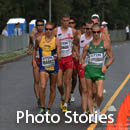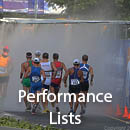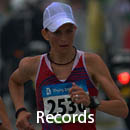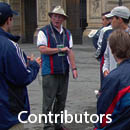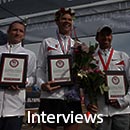ERIN GRAY
2013 - Erin Gray - Moving Forward Interview
Erin, you came on the scene and made an impact in a very short amount of time. How did you get introduced to race walking and why did you decide to do it?
I got interested through my dad who had been a race walker back in the 70’s and he suggested I try it because I had been a distance runner for many years and had many stress fractures over the years and it all came to a head when I broke my femur in 2008 going into my senior year of college. So I finished up that year on the track and cross country team at the University of Arkansas and then when I graduated Dad suggested I try to race walk. I did and just started racing.
Have you had any issues with stress fractures or broken bones since?
No, Thanks G-d.
So dad gave you good advice.
Yes
How good of a runner were you?
I was ok. I was pretty good in high school. I won our state cross country meet my sophomore year. My personal record for the 3K was 9:58. In Oregon we did 3K and 1500. I was always better at the longer distances, my 5K PR was 17:00. My 5K PR was my 10K PR was 36:30.
Was this in high school or college?
I ran my 10K PR in college, but my 3K and 5K PRs were run in high school.
So you won the state meet during your sophomore year, but you didn’t mention after that, so I am assuming you didn’t win the other years.
For my freshman year I was 4th, my sophomore year I won, my junior year I was 7th and my senior year I actually had a sacroiliac joint disjunction that I had been running on for the whole season and I just kept getting worse and worse. I don’t even remember how far back I finished. I think I was around 26th. Then I started seeing a PT for the problem and he fixed me, so I was able to return to full form after that.
You graduated college and you started to race walk, how do you compare race walking at an elite level to your running experience?
I feel like training in the race walk has always been a little less intense than for running, but I think that may be because race walking is easier on your body than running is. I know that when I was running in college and surrounded by other runners the pressure that we felt from our coach and the other runners was pretty intense all the time. So when I train with my dad and get one on one attention it is a little more relaxed. Over the years my form has improved and now the mileage and intensity has increased a lot and it compares more equally to the training I was doing in college.
Heart rate wise do you remember what your heart rate was in a running race vs. a walking race?
I never wore my heart rate monitor when I am actually in a race.
How about in a workout?
It is surprisingly comparable. When I am out on a temp run my heart rate is between 180-185 and then when I race walk intervals my heart rate is well over 200.
That’s what I was expecting to hear. So when you say race walking isn’t as intense, you are not really speaking to the difference in physicality, but to the group dynamic and coach dynamic.
I think so, yes. The coaching style between my college coach and my dad are just a little different. Also, the group dynamic is different we were a Division 1, highly ranked, top 10 team every year. It’s hard to be in that kind of environment.
So now do you train alone?
I do.
Do you prefer that or do you prefer to have the competition to push you?
I think when I was in high school I trained alone as well. I think I prefer it. It does get tiresome sometimes. You have to generate all your own energy and motivation and everything like that, but I think I prefer it. I guess since most of my success has come from training alone I guess it makes sense that I prefer that.
Does your dad leave it on the track or when you come home for family visits do you feel your coach is in the house at all times?
No he’s not in the house at all times. I have a lot of other things going on. I just started medical school in August, so that’s taken up a lot of my mental and physical energy recently. Of course, we still talk about training when I go home. My school is only an hour North of Eugene, so I still see them fairly regularly. There are other things going on in our family, my life, and my parent’s lives that we keep it to a minimum.
So you have a good balance.
I like to think so.
OK, you came on the scene and your dad was encouraging you. Did he suggest you could make the Olympic Team or did that come later on?
The Olympic Team thing came later. At first I was really reluctant to try race walking. Amongst runners it has such a bad image and so what he said was if your goal is to try to make World teams not necessarily the Olympic team, but any international team then race walking is the best way for you to do it. So I guess the Olympic thing started to come into fruition when in 2011 I had a big improvement in my time, but was having issues with my form and getting disqualified so once we were able to turn that around it became a real possibility I could make the Olympic team.
You are doing well. You start thinking about qualifying for the Olympic Trials, what was your training like leading up to the Olympic Trials?
I was doing a lot of strength training. We had one tempo day a week. A lot of stuff on the track since the Olympic Trials race was going to be on the track. I did lots of easy walks and tempo walks on the track getting used to going around and around. I was doing one short to medium interval workout a week and then a long walk to.
So going into the Olympic Trials you had a B standard and that means only one of you gets to go unless two of you break the A standard in the race.
Right.
So going into the race I am assuming your mentality is you are going there to win.
Right
Do you want to talk about your race strategy and how the race unfolded?
Sure, my race strategy was to establish a rhythm my first half and I was hoping to put in a surge right after halfway, but I think I let myself be controlled by my competition. What ended up happening is right about halfway we started to fall into a lull of slowing down more and more. Maria and I were switching off the lead and when I would take over I would try to push the pace for a couple of laps, but we would fall back into a meandering pace. I wish I had just gone and ignored everyone else on the track because what ending up happening is what happens in every race I let my pace be so erratic, I just kind of had nothing left at the end. With 1,600M to go, Maria and Miranda put in a surge and I had no response.
Did you see Miranda coming?
I didn’t. I wasn’t really paying attention when she was coming up behind us. I was just kind of focusing on getting to the finish.
It must have been quite a surprise when after dropping Teresa and making it a two women race that Miranda showed up.
I was surprised, but it wasn’t one of those things where I freaked out over it. I am not one to freak out in a race; I just try to keep to my strategy the best I can. You know everyone else can do what they want. I do feel like I let the competition control the race more than I would have preferred.
Well, it is certainly a good lesson for the Rio trials in 2016.
That’s true.
Hopefully, as a fan, promoter, and a former competitor I say that we are all looking for there to be three or more women with the A standard going into the race and you’ll be one of them. That way it’s not a race for one of you to make the Olympics but for at least three woman to make it.
Right.
So you mentioned you are in med school. It’s a long way to the next Olympics. Four years is a long time, it’s actually longer than you’ve been race walking. So what’s your plan? Are you going to train hard for four years or are you going to focus on school and maybe two years out pick it up?
I am going to have to play it by ear mostly. I have an A standard now and am only in my first year of school. I am going to make a real effort to make the World Championships in Moscow in August. The nice thing about the first two years of school is that most of our classes are lecture style and recorded. So there’s a pretty minimal amount of actual required live classroom time. It’s nice because on big workout days if I miss a few lectures in the morning, I can go back and watch them in the evening when I am studying. When I say I have to play it by ear, in the 3rd and 4th year all of our learning is in rotations. We go around learning different specialties, and can decide which ones we want to focus on and so it’s a little different because instead of being at school for a few hours a day, I may have to be in clinics for 8 to 10 hours a day. So, I really just am going to have to see what my schedule is like in my 3rd and 4th year. School is my #1 priority.
If you look at the top women, between you, Maria, and Miranda you are all juggling an academic career which on its impressive, but it’s not necessarily the best thing for the future of American race walking.
That’s true, we can’t really make money race walking. I was working full-time when I was training for the Olympic Trials. It’s one of those things where you have to do the best you can. I feel like we’ve all done really well given the schedules we’ve had to juggle.
I think given where you are in life, you are all doing well. The problem comes, and it is a challenge for American race walking in general, is whether your goal is to make an Olympic Team or to stand on a podium. If it is to stand on a podium, you are competing with people who are not going to med school and that’s not an even fight, not even close.
Exactly!
The long term answer is to build the base, have a lot more people involved with race walking and that hopefully will lead to corporate sponsorships and then it might be ok to say that race walking is my career, but today that’s just not viable.
Maybe it will be in the future. I’ve said this before, if we could somehow convince people in the marathon or 10K who finished 10th to 20th place, we would be so much better in the world.
Sure.
I honestly feel the 10K women in that area are way more athletic than I am.
True, but it takes a certain coordination and body structure that not every runner possesses. So some of them would transition well, but not all.
It’s hard to convert from running. For my first two years of competition I had about a 50% DQ rate for lifting. It can be a hard transition as you are using completely different muscle groups.
Any advice you have then for runners thinking about switching over to race walking?
Well I guess I would just say to them what my dad said to me is that if you are not making world teams as a runner try race walking. Find someone that can teach you the form. The training principles are very similar between tempo and interval workouts are very similar. It’s endurance training. It’s really about just getting down that form.
The only real difference of the training is the mix of the formula, but the basic training is the same.
Exactly.
